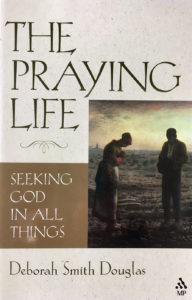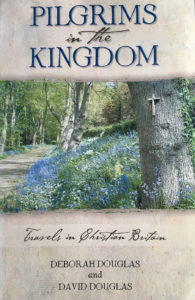By the Light of Fiction
Reading as a Christian Practice

Over the course of my life I have taken on all manner of “spiritual practices,” from now-I-lay-me-down-to-sleep to Transcendental Meditation to centering prayer. I have prayed with icons, the Rosary, the psalms. I have picked up practices and put some down. Some still discipline and nourish my praying life.
But of all the spiritual disciplines I have attempted, the habit of steady reading, deep and wide, has helped me most and carried me farthest. Not even primarily reading Scripture (although that has been indispensable), but reading fiction—classics of world literature and mass-market paperbacks, fairy tales and Greek myths, science fiction and detective novels—has done more to inform my faith, baptize my imagination, and strengthen my courage than all the prayer-techniques in the world.
For as long as I can remember, even before I could read, I have loved books. The heft and smell of them, their implicit promise. The magical way they hold riches beyond measure, like chests of pirate gold. The way they open doors to other worlds. The house I grew up in had floor-to-ceiling bookcases in nearly every room, books piled on tables, books stacked in the hall and lining the stairs.
I still remember the shock of amazement and delight when I first learned to read by myself: the alchemical moment when random hieroglyphics on the page leapt into meaning, forming pictures in my mind. From that magic moment, I took off like a rocket. I read fairy tales from Germany, France, Russia, Denmark, Scandinavia—I read Arthurian legends and Golden Books, Andrew Lang and George MacDonald. I went steadily though everything the home shelves and the public library’s children’s room had to offer.
My passion for reading alarmed my father; by the time I was in the third grade, he was worrying aloud about bluestockings and bookworms, mournfully predicting myopia and spinsterhood. But my mother, amused and pleased, encouraged me.
In fact, I realize now that my mother carefully crafted my love of books from my earliest childhood. Like an Argonauta, the mysterious many-tentacled deep-sea cephalopod known since ancient times for the beauty of its fragile egg cases, my mother launched me on a paper nautilus of her own creation. As though she knew that she could not stay with me, and that I would not survive in the dark depths for which she was bound, she carried me up to the sunlit surface of the open sea and left me there, in a life-raft made of books.
By the time I was ten, I needed that life-raft. That year, my mother suffered major head injury in a catastrophic car crash. Despite surgery and extensive rehabilitation, the irreversible brain trauma caused radical changes in her personality, and led to what is called (with no apparent irony) “progressive” dementia.
From that day forward, I had lost her—and would continue inexorably to lose her for the next forty years that she survived. My father, unable to acknowledge or cope with his own tremendous loss, retreated into alcoholism.
All our lives began to unravel.
Reading became not just a pleasure but a way to survive. Not only a means of escaping a painful reality, but a way to find meaning in it. The paper nautilus my mother built, in which she carried me to the light, was for me a means of grace.
All those fairy tales came to my assistance: I knew that children could be thrown without warning into dark forests or dungeons, that they would have to be brave and clever to find their way out. Mothers disappeared. Chasms opened unexpectedly. Somehow the children I had met in fairy tales kept company with me in those bewildering days. Their stories enabled me to hope, kept me from despair when my own mother seemed to be replaced by a sharp-tongued stranger, when all familiar landmarks seemed gone forever. Like those other children I might feel alone in the dark, but like them I came to trust that I would somehow be led to the right path. I had learned what child psychiatrist Bruno Bettelheim in The Uses of Enchantment believed that all children will learn from fairy tales if we let them: terrible things may happen, but help and guidance will be given when needed.
In response to a woman who declared that fairy tales were bad for children because they frighten them, G.K. Chesterton sensibly pointed out that children are already frightened. Children know there are dragons in the world; what fairy tales give them is someone to kill the dragon. “At the four corners of a child’s bed stand Perseus and Roland, Sigurd and St. George.” Withdrawing that guard of heroes will only leave the child to fight her battles alone. Chesterton knew that fairy tales reassure children that “these limitless terrors have a limit, that these shapeless enemies have enemies in the knights of God, that there is something in the universe more mystical than darkness, and stronger than fear.”
J.R.R. Tolkien described the elemental functions of traditional fairy stories as “recovery” (from blindness, sickness, or despair), “escape” (from danger or captivity), and “consolation” (a fleeting glimpse of “joy beyond the walls of the world, poignant as grief”).
Of course, God is great and grace is amazing: I trust that I would have been given other means of recovery, escape, and consolation had I been raised in a world without books. Literacy obviously is not essential to a Christian life (universal literacy is recent and a radical dream, feared by tyrants), but the story is essential. Whether we receive the saving story at the heart of our faith by hearing it told to us or by reading it for ourselves, discipleship depends upon some imaginative experience of a God who enters into human history. Reading is not the only providential way out of isolation, sorrow, or fear. But it was the way out for me, and I shall always be grateful for the recovery, escape and consolation I found in books.
Particularly (naturally) for a time I was avid for stories of shipwreck, rescue, perseverance and survival: Treasure Island, Huckleberry Finn, Swiss Family Robinson, Swallows and Amazons. But I went on to devour all of Louisa May Alcott and Laura Ingalls Wilder, E. Nesbit and Enid Blyton, Charlotte’s Web, The Secret Garden, The Wind in the Willows, The Chronicles of Narnia.
All that reading disposed me to encounter Scripture reverently, to be sure, but wide open to its magic power. Armed with myth and fairy tale, I unconsciously negotiated my Scylla-and-Charybdis way between the twin perils of fundamentalism on one side and de-mythologizing on the other. I went straight as an arrow in Sherwood Forest to the treasure of the story buried in the text, eager to hear more of any tale that began with “a wandering Aramean was my father…” or “on the night he was betrayed….” The parting of the Red Sea and water changed to wine at a wedding in Cana presented no problem to a child whose imagination had cut its teeth on straw spun to gold, swords pulled from stones, drowned church bells ringing deep beneath the sea.
My grounding in fairy tale and myth also prepared me for the imaginative praying with Scripture at the heart of the Ignatian spirituality that has come to mean so much to me. My habit of endlessly rereading beloved stories prepared me for the meditative repetitive reading of sacred story that lectio divina is all about.
But beyond disposing my mind and heart to enter into Scripture in a saving way, that early reading gave me the tools to understand my own experience. By the time I was ten, the indispensable faculties of imagination, memory, and will had all been formed by the stories I had read. For better or for worse, what we read does form us: shaping the way we perceive and interpret reality, determining what we hope for and hold dear. Making us, in fact, who we are. As Oscar Wilde observed, “it is what you read when you don’t have to that determines what you will be when you can’t help it.”
We read to live other lives. C.S. Lewis wrote that “we want to see with other eyes…to feel with other hearts, as well as with our own. …Literature as Logos is a series of windows, even of doors. One of the things we feel after reading a great work is ‘I have got out.’ Or from another point of view, ‘I have got in,’ pierced the shell of some other [creature] and discovered what it is like inside.”
As African-American writer James Baldwin put it, “you think your pain and your heartbreak are unprecedented in the history of the world, but then you read. It was books that taught me that the things that tormented me most were the very things that connected me with all the people who were alive, or who had ever been alive.”
By the time I was in college, immersed in the riches of Spenser and Chaucer, Shakespeare and Dickens, Jane Austen and George Eliot, I already knew how to pay attention to a text, how to tell good writing from bad, truth from falsehood. But the riches of English literature did more than furnish my mind or refine my taste: they taught me where and how to find meaning in my life. Reading gave me companions, courage, direction, hope. Books deepened my compassion, baptized my imagination, called me to choose a side, to put my own sorrows in perspective, to take responsibility for my life.
As I grew older, I read more widely: biography, history, poetry, essays. But I always returned, like a homing pigeon, to fiction. I have found the good news of the Gospel and strength for my faith in all kinds of contemporary fiction: Wendell Berry’s Jayber Crow, Marilynne Robinson’s Gilead, Debra Dean’s The Madonnas of Leningrad, Edwin O’Connor’s The Edge of Sadness, Madeline Miller’s The Song of Achilles, Gina Ochsner’s People I Wanted to Be, George Saunders’ Lincoln in the Bardo.
Even reading detective novels can be full of grace. The detective novels I read voraciously now—like the fairy tales I read as a child—remind me to pay attention, seek the truth, watch for what lies hidden beneath the surface. Both detective fiction and fairy tales offer escape from captivity, but never flight from responsibility. What matters is not security but encounter, revelation, transformation, risk, participation in mystery, commitment to great ends, allegiance to a side. The children in Narnia have been called there for a purpose; they have work to do on Aslan’s side. Adam Dalgliesh, Father Brown, and Siri Paiboun put themselves in harm’s way to protect the innocent and bring to light the deeds men do in darkness.
Robert Frost said that a poem begins in delight and ends in wisdom. And so has my reading life.
A journey that began with the magic of words, the power of language, has led me to the land of silence. The concentration of attention that both reading and praying require opens eventually into the expanded awareness of contemplation. As Teresa of Ávila noted, when one is beginning to pray “it is a great thing to have a good book” at hand as an aid to recollection. But as one progresses to the prayer of quiet, “all reading and discursive reasoning” should come to an end, that one may simply rest in God’s presence.
The paper nautilus my mother built for me has carried me further than she or I could have imagined: to the blessed, blessing point where all words fail at last.

